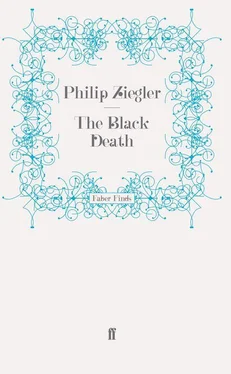From March until July, there was a lull in the persecution. Then the massacre was renewed at Frankfurt-am-Main and, in August, spread to Mainz and Cologne. In Mainz, records one chronicler, the Jews took the initiative, attacked the Christians and slew two hundred of them. The Christian revenge was terrible – no less than twelve thousand Jews, ‘or thereabouts’, in their turn perished. {194} 194 43 Heinrici Rebdorfensis, ‘Annales Imperatorum’, Fontes Rerum Germanicarum, Vol. IV, p. 534.
In the North of Germany, Jewish colonies were relatively small, but their insignificance was no protection when the Black Death kindled the hatred of the Christians. In the spring of 1350 those Jews of the Hansa towns who had escaped burning were walled up alive in their houses and left to die of suffocation or starvation. In some cases they were offered the chance to save themselves by renouncing their faith but few availed themselves of the invitation. On the contrary, there were many instances of Jews setting fire to their houses and destroying themselves and their families so as to rob the Christians of their prey.
Why the persecutions died down temporarily in March 1349 is uncertain. It could be that the heavy losses which the Black Death inflicted on the Jews began to convince all those still capable of objectivity that some other explanation must be found for the spread of the infection. If so, their enlightenment did not last long. But the blame for the renewal of violence must rest predominantly with the Flagellants. It is difficult to be sure whether this was the work of a few fanatics among the leaders or merely another illustration of the fact that mass-hysteria, however generated, is always likely to breed the ugliest forms of violence. In July 1349, when the Flagellants arrived in procession at Frankfurt, they rushed directly to the Jewish quarter and led the local population in wholesale slaughter. At Brussels the mere news that the Flagellants were approaching was enough to set off a massacre in which, in spite of the efforts of the Duke of Brabant, some six hundred Jews were killed. {195} 195 44 ‘Aegidii Li Muisis’, De Smet, op. cit., Vol. II, pp. 342–3.
The Pope condemned the Flagellants for their conduct and the Jews, with good reason, came to regard them as their most dangerous enemies.
On the whole the rulers of Europe did their best, though often ineffectively, to protect their Jewish subjects. {196} 196 45 See, in particular, R. Hoeniger, Der Schwarze Tod in Deutschland, Berlin, 1882, pp. 9–11.
Pope Clement VI in particular behaved with determination and responsibility. Both before and after the trials at Chillon he published Bulls condemning the massacres and calling on Christians to behave with tolerance and restraint. {197} 197 46 4 July and 26 Sept 1348, Raynaldus, Annales eccles. ed. Mansi, Vol. VI, 1750, p. 476.
Those who joined in persecution of the Jews were threatened with excommunication. The town-councillors of Cologne were also active in the cause of humanity, but they did no more than incur a snub when they wrote to their colleagues at Strasbourg urging moderation in their dealings with the Jews. The Emperor Charles IV and Duke Albert of Austria both did their somewhat inadequate best and Ruprecht von der Pfalz took the Jews under his personal protection, though only on receipt of a handsome bribe. His reward was to be called ‘Jew-master’ by his people and to provoke something close to a revolution. {198} 198 47 Hecker, op. cit., p. 42.
Not all the magnates were so enlightened. In May 1349 Landgrave Frederic of Thuringia wrote to the Council of the City of Nordhausen telling them how he had burnt his Jews for the honour of God and advising them to do the same. {199} 199 48 Haeser, op. cit., Vol. III, p. 181.
He seems to have been unique in wholeheartedly supporting the murderers but other great rulers, while virtuously deploring the excesses of their subjects, could not resist the temptation to extract advantage from what was going on. Charles IV offered the Archbishop of Trier the goods of those Jews in Alsace ‘who have already been killed or may still be killed’ and gave the Margrave of Brandenburg his choice of the best three Jewish houses in Nuremberg, ‘when there is next a massacre of the Jews’. {200} 200 49 J. Parkes, The Jews in the Mediaeval Community, London, 1938, p. 118.
A more irresponsible incitement to violence it would be hard to find.
Nor were those rulers who sought to protect the Jews often in a position to do much about it. The patrician rulers of Strasbourg, when they tried to intervene, were overthrown by a combination of mob and rabble-rousing Bishop. The town-council of Erfurt did little better while the city fathers of Trier, when they offered the Jews the chance to return to the city, warned them quite frankly that they could not guarantee their lives or property in case of further rioting. Only Casimir of Poland, said to have been under the influence of his Jewish mistress Esther, seems to have been completely successful in preventing persecution.
An illustration of the good will of the rulers and the limitations on their effective power comes from Spain. Pedro IV of Aragon had a high opinion of his Jewish subjects. He was therefore outraged when the inhabitants of Barcelona, demoralized by the Black Death and deprived, through the high mortality and the flight from the city of the nobles and the rich, of almost any kind of civil authority, turned on the Jews and sacked the ghetto. On 22 May 1348 he sent a new Governor to the city and gave orders that the guilty were to be punished and no further incidents allowed. {201} 201 50 A. Lopez de Meneses, ‘Una consecuencia de la Peste Negra en Cataluña: el pogrom de 1348’. Sefarad, XIX, 1959, p. 92.
A week later he circularized his authorities throughout the kingdom ordering them to protect the Jews and prevent disturbances. {202} 202 51 ‘Documentos acerca de la Peste Negra en los dominios de la Corona de Aragon’, Consejo superior de Investigaciones Cientificas, Vol. VI, 1956, p. 298.
By February 1349 the new Governor of Barcelona had made no progress in his search for those responsible. King Pedro grew impatient and demanded immediate action. In a flurry of zeal a few arrests were made, including Bernal Ferrer, a public hangman. But the prosecution in its turn was extremely dilatory. Six months later no judgement had been passed and, in the end, it seems that Ferrer and the other prisoners were quietly released.
Meanwhile, in spite of the King’s injunctions, anti-Jewish rioting went on in other cities of Aragon. There was a particularly ugly incident in Tarragona where more than three hundred Jews were killed. Here again Pedro demanded vengeance and sent a commission to investigate. The resulting welter of accusation and counter accusation became so embittered that virtual civil war ensued. In the end this prosecution too was tacitly abandoned. But the King did at least ensure that a new ghetto was built and intervened personally on behalf of several leading Jews who had been ruined by the loss of their houses and documents. When the next epidemic came in 1361 the Jews appealed to the King for protection and an armed guard was placed at the gates of the ghetto.
Flanders was bitten by the bug at about the same time as the Bavarian towns. ‘Anno domini 1349 sloeg men de Joden dood’ {203} 203 52 L. Bertrand, ‘Contribution à l’Étude de la Peste dans les Flandres’, Proc. 2nd Int. Cong. Hist. Med., Evreux, 1922, p. 43.
is the chronicler’s brutally laconic reference to massacres that seem to have been on a scale as hideous as those in Germany. In England there were said to be isolated prosecutions of Jews on suspicion of spreading the plague but no serious persecution took place. It would be pleasant to attribute this to superior humanity and good sense. The substantial reason, however, was rather less honourable. In 1290, King Edward I had expelled the Jews from England. Such few as remained had little money and were too unobtrusive to present a tempting target. Some small credit is due for leaving them in peace but certainly it cannot be held up as a particularly shining example of racial tolerance.
Читать дальше












